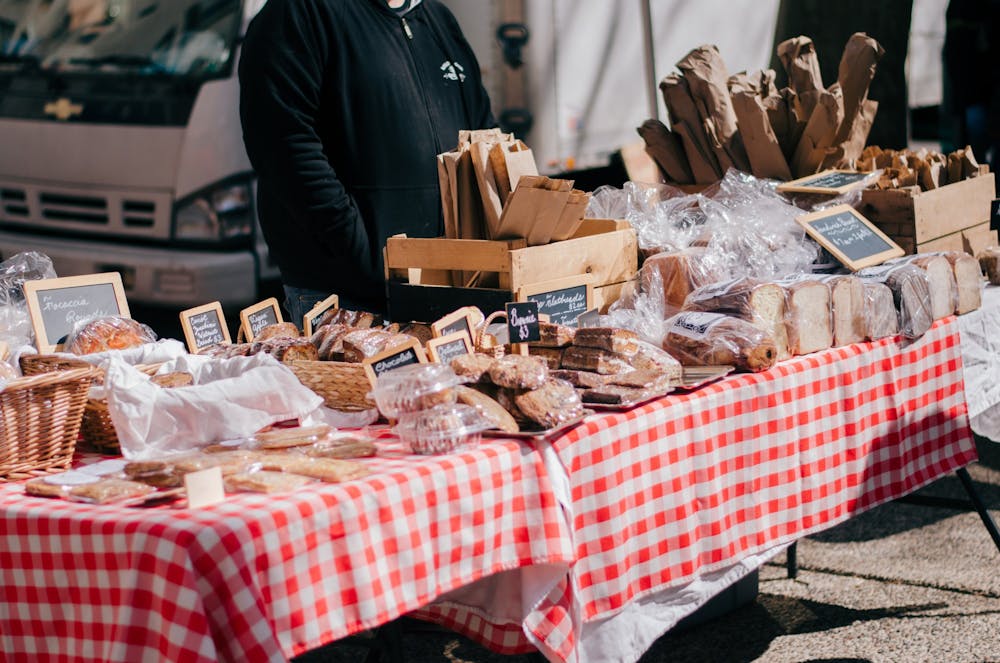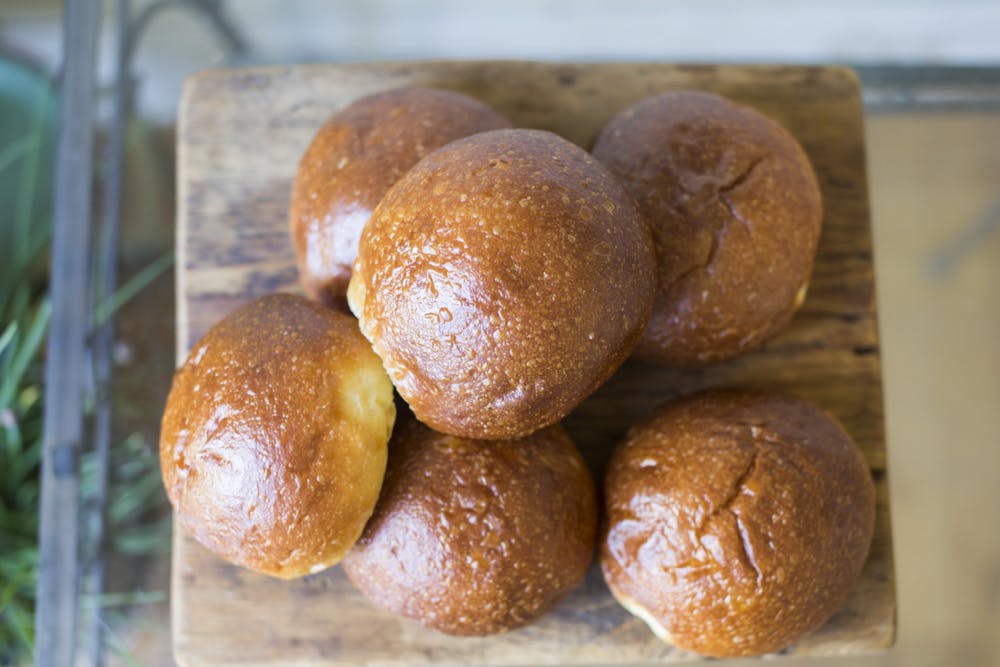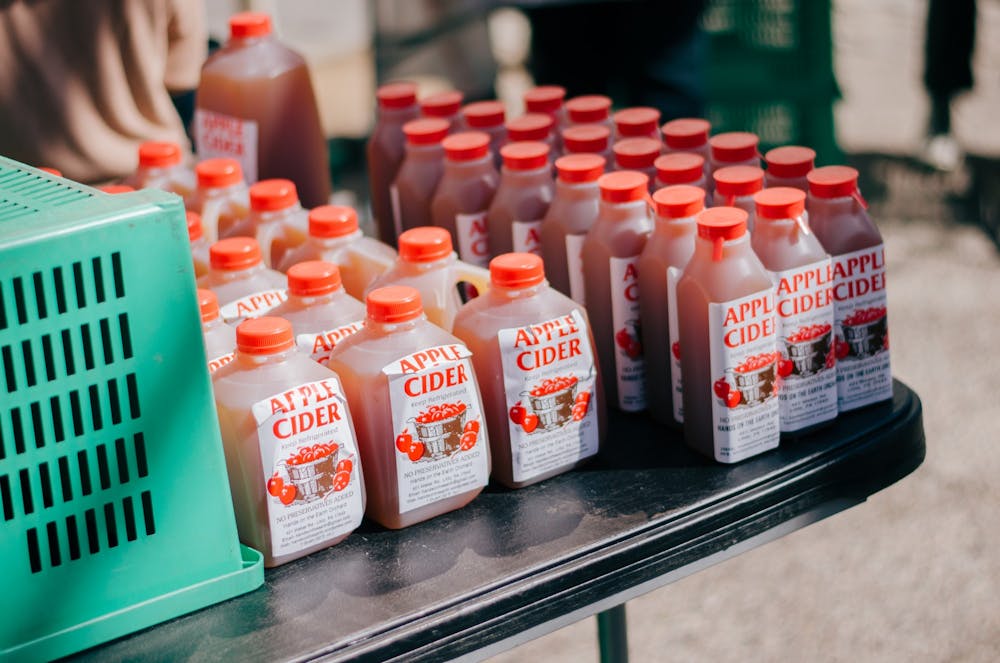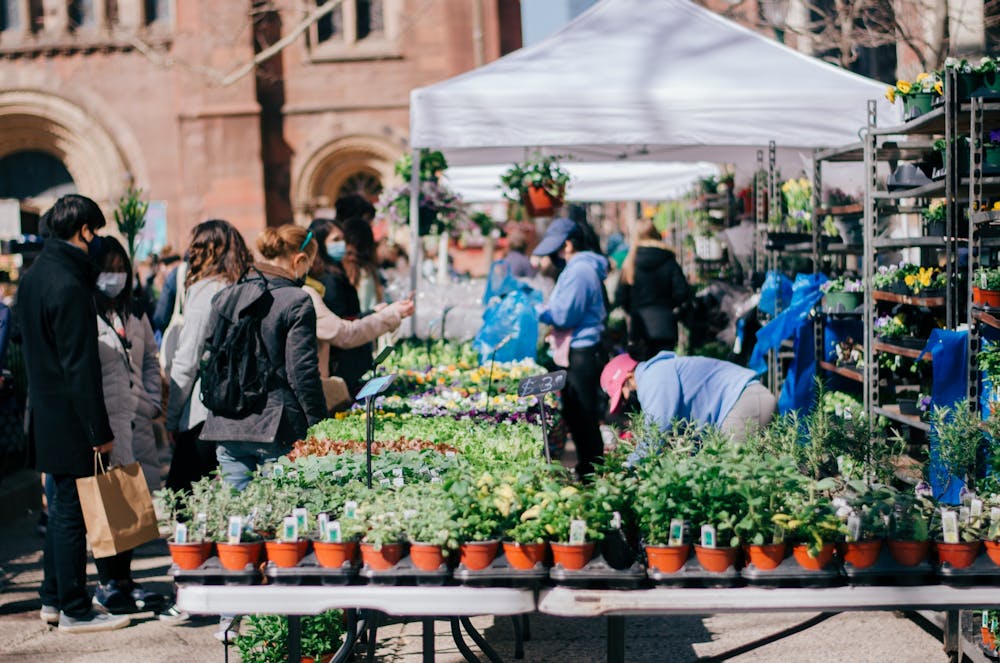Located in the middle of towering skyscrapers and close–knit cafés, the Rittenhouse Farmers’ Market has been a staple in Philadelphia for over 20 years. Saturday mornings at the farmers’ market have been an especially popular activity for college students who are on campus this semester. With just a 20–minute walk off Penn’s campus, you are bound to see the quintessential hustle and bustle of the outdoor market in Center City—dogs strolling by on leashes, rows of colorful produce, and lines of eager customers waiting by every street corner.
While the pandemic has undoubtedly left many local businesses in difficult positions, Philly’s market vendors have shown that they can rise above the hardships thrown their way. Their resilience is what has preserved the excitement of visiting Philadelphia’s farmers’ markets every weekend.
Wildflour Bakery, an artisan wholesale bread and pastry bakery located in Northeast Philadelphia, has been in operation since 2003. For years, Laura Yaghoobian and her husband, Nishon Yaghoobian, primarily focused on wholesale partnerships with local restaurants, caterers, cafés, and other small businesses. Laura Yaghoobian’s dream, however, has always been to open her own retail shop. So, when Wildflour Bakery was invited to attend one of Philadelphia’s open–air farmers’ markets nearly 13 years ago, it served as the perfect retail component to their business. Since then, their bakery has been a participant in many farmers’ markets in the area, including the Rittenhouse Farmers’ Market.

However, Wildflour Bakery faced some significant challenges due to the pandemic. Their wholesale orders—their primary focus at the time, according to Laura Yaghoobian—were decimated, as restaurants cut back on orders, schools closed their doors, and local cafés shut down indefinitely. The particular timing of the pandemic was another hurdle, as Wildflour’s sales normally tend to slow down in the winter and ramp up in the spring, right when COVID–19 shutdowns were first occurring. But this didn’t stop the Yaghoobians from seeking alternate business ventures. To provide their products to members of the community who were immunocompromised or scared to go to indoor grocery stores, Wildflour Bakery restarted their home delivery service—which proved to be a great success. "[The delivery service] was really what took off and sustained us for the first six to nine months,” says Laura Yaghoobian. “Even still, we do quite a volume now. In the very beginning, we were doing deliveries every single day just to different areas of the city—different communities.”
Similarly, Laura Yaghoobian saw farmers’ market sales increase dramatically, as customers flocked to more outdoor shopping options. In order to abide by safety guidelines and maintain the well–being of their customers, the bakery has been extremely cognizant about packaging their products to avoid any exposure to the air. There were many hurdles that the Yaghoobians had to navigate during the pandemic, but it also gave them time to think about what comes next for Wildflour Bakery. Laura Yaghoobian hopes to continue their home deliveries, as well as their partnership with Philly Foodworks, an online market and food share program that offers local food options to the Greater Philadelphia region.

Despite the many challenges of the pandemic, Laura Yaghoobian’s passion for creating nourishing food has endured. More than anything, she loves the heartfelt interactions she has with her customers—when people compliment their baked goods at the farmers’ market, leave small “thank you” notes behind on their home delivery van, or send texts and emails to her. She finds that running a business is not always easy, but it is these small moments that make her work so incredibly rewarding.
Frecon Farms is another local vendor that has handled the pandemic head–on. As a family–run orchard, bakery, and cidery in Berks County, Pa., Frecon Farms has been in operation since 1944. Steve Frecon, the owner of Frecon Farms, describes the effect of COVID–19 on the family business as a rollercoaster full of challenges and hurdles—but also some unexpected positives. Like many other businesses in the area, the pandemic severely impacted the farm’s wholesale program. In addition to maintaining their employees’ safety, Frecon Farms also had to find a way to handle their perishable produce. In the early months of the pandemic, handling new forms of pre–ordering and packaging was expensive, chaotic, and difficult. However, the business wanted to overcome these challenges to send a message: Local agriculture could respond to the pandemic in the same ways that national agriculture or large big–box grocery stores could. And Frecon Farms has certainly proved their resilience in the midst of this pandemic. They have seen an increase in sales at farmers’ markets and received a great amount of support and feedback from the local community.
In addition to a bump in sales of their fresh fruits and vegetables, Frecon found that the farm’s UPick service, an opportunity to pick your own produce, has done extremely well. “We were shocked and amazed by the response of people looking to get outside—looking to do an outdoor activity where they felt safe—and an orchard and apple picking could present that sort of opportunity.” In the future, Frecon Farms is looking to expand more picnic tables and outdoor space for people to safely enjoy each other’s company.

Frecon also finds the heightened interest in local foods to be very encouraging. “This whole ecosystem of local food movement is frankly what excites me the most—being at the front end of it as a producer and a grower,” he says.“It gives you motivation and enthusiasm to try new apple varieties and plant new peach varieties and look for new additions.” Even after the pandemic, Frecon Farms intends to continue its nearly 80–year–old tradition of providing fresh, nutritious, and one–of–a–kind products throughout Philadelphia.
Hands on the Earth Orchard is another long–time vendor at Philly farmers’ markets. Located in Lancaster County, Pa., the business has been in operation since 2012. Dave Fahnestock, the owner of Hands on the Earth, describes his business as a half–farm, half–retail business that always looks to produce good food. While the retail side of the orchard has shifted due to COVID–19, operations on the farm itself haven’t changed significantly. “Spring is coming, just like it did a year ago. Crops come and go. So I am blessed to be in a place where my daily routine has not been influenced too much now,” Fahnestock says. He's also grateful that he was able to jumpstart the business’s website early into the pandemic, and while it has been a challenge to navigate the shift to online orders, he finds that going online has actually made him feel closer to his customers. He noticed that he knows more people’s names from all the emails and messages he receives. While online purchases are a great option for consumers, Fahnestock still doesn’t foresee farmers’ markets ever truly going away.

At farmers’ markets, people are not only able to feel safe getting their food, but they also have the assurance that the food they eat is safe. During the pandemic, Fahnestock saw that food was a source of comfort and stability for many communities when the world was turning upside down. Especially in the city where people don't feel as close to their food as they do in the countryside, he is thankful for all the appreciation he receives at farmers’ markets. “People just really appreciate us being out there, and so that is not something we take lightly; we really appreciate that,” he shared. While having a website for ordering is great, Fahnestock thinks that the organic interactions that form at farmers’ markets aren’t something that can be found online. “I feel like there will always be a place for farmers' markets, even if people do kind of flock to online sales,” he says. “So, for some things, I really feel like that outdoor–type environment is really great for shopping, and I hope it continues.” Hands on the Earth Orchard is looking forward to another great year, and their coveted made–to–order apple cider donuts will remain a classic item at the Rittenhouse Farmers’ Market.
Although we are grappling with another year of the COVID–19 pandemic, there is much to look forward to in Philly’s outdoor market scene. As students, the enjoyment we get from our trips to the farmers’ market is not something we can take for granted. Even beyond the pandemic, we should continue to support the businesses that make up the heart of Philadelphia’s farmers’ market experience.

